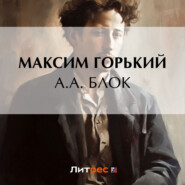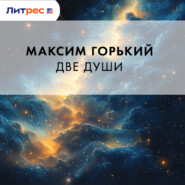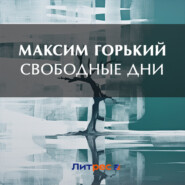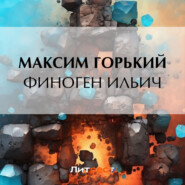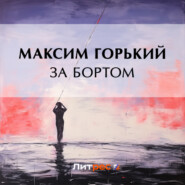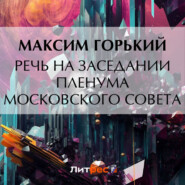По всем вопросам обращайтесь на: info@litportal.ru
(©) 2003-2025.
✖
Mother
Настройки чтения
Размер шрифта
Высота строк
Поля
"She is speaking God's words!" a man shouted hoarsely and excitedly. "God's words, good people! Listen to her!"
Another man said in pity of her:
"Look how she's hurting herself!"
"She's not hurting herself, but hitting us, fools, understand that!" was the reproachful reply.
A high-pitched, quavering voice rose up over the crowd:
"Oh, people of the true faith! My Mitya, pure soul, what has he done? He went after his dear comrades. She speaks truth – why did we forsake our children? What harm have they done us?"
The mother trembled at these words and replied with soft tears.
"Go home, Nilovna! Go, mother! You're all worn out," said Sizov loudly.
He was pale, his disheveled beard shook. Suddenly knitting his brows he threw a stern glance about him on all, drew himself up to his full height, and said distinctly:
"My son Matvey was crushed in the factory. You know it! But were he alive, I myself would have sent him into the lines of those – along with them. I myself would have told him: 'Go you, too, Matvey! That's the right cause, that's the honest cause!'"
He stopped abruptly, and a sullen silence fell on all, in the powerful grip of something huge and new, but something that no longer frightened them. Sizov lifted his hand, shook it, and continued:
"It's an old man who is speaking to you. You know me! I've been working here thirty-nine years, and I've been alive fifty-three years. To-day they've arrested my nephew, a pure and intelligent boy. He, too, was in the front, side by side with Vlasov; right at the banner." Sizov made a motion with his hand, shrank together, and said as he took the mother's hand: "This woman spoke the truth. Our children want to live honorably, according to reason, and we have abandoned them; we walked away, yes! Go, Nilovna!"
"My dear ones!" she said, looking at them all with tearful eyes. "The life is for our children and the earth is for them."
"Go, Nilovna, take this staff and lean upon it!" said Sizov, giving her the fragment of the flag pole.
All looked at the mother with sadness and respect. A hum of sympathy accompanied her. Sizov silently put the people out of her way, and they silently moved aside, obeying a blind impulse to follow her. They walked after her slowly, exchanging brief, subdued remarks on the way. Arrived at the gate of her house, she turned to them, leaning on the fragment of the flag pole, and bowed in gratitude.
"Thank you!" she said softly. And recalling the thought which she fancied had been born in her heart, she said: "Our Lord Jesus Christ would not have been, either, if people had not perished for his sake."
The crowd looked at her in silence.
She bowed to the people again, and went into her house, and Sizov, drooping his head, went in with her.
The people stood at the gates and talked. Then they began to depart slowly and quietly.
PART II
CHAPTER I
The day passed in a motley blur of recollections, in a depressing state of exhaustion, which tightly clutched at the mother's body and soul. The faces of the young men flashed before her mental vision, the banner blazed, the songs clamored at her ear, the little officer skipped about, a gray stain before her eyes, and through the whirlwind of the procession she saw the gleam of Pavel's bronzed face and the smiling sky-blue eyes of Andrey.
She walked up and down the room, sat at the window, looked out into the street, and walked away again with lowered eyebrows. Every now and then she started, and looked about in an aimless search for something. She drank water, but could not slake her thirst, nor quench the smoldering fire of anguish and injury in her bosom. The day was chopped in two. It began full of meaning and content, but now it dribbled away into a dismal waste, which stretched before her endlessly. The question swung to and fro in her barren, perplexed mind:
"What now?"
Korsunova came in. Waving her hands, she shouted, wept, and went into raptures; stamped her feet, suggested this and that, made promises, and threw out threats against somebody. All this failed to impress the mother.
"Aha!" she heard the squeaking voice of Marya. "So the people have been stirred up! At last the whole factory has arisen! All have arisen!"
"Yes, yes!" said the mother in a low voice, shaking her head. Her eyes were fixed on something that had already fallen into the past, had departed from her along with Andrey and Pavel. She was unable to weep. Her heart was dried up, her lips, too, were dry, and her mouth was parched. Her hands shook, and a cold, fine shiver ran down her back, setting her skin aquiver.
In the evening the gendarmes came. She met them without surprise and without fear. They entered noisily, with a peculiarly jaunty air, and with a look of gayety and satisfaction in their faces. The yellow-faced officer said, displaying his teeth:
"Well, how are you? The third time I have the honor, eh?"
She was silent, passing her dry tongue along her lips. The officer talked a great deal, delivering a homily to her. The mother realized what pleasure he derived from his words. But they did not reach her; they did not disturb her; they were like the insistent chirp of a cricket. It was only when he said: "It's your own fault, little mother, that you weren't able to inspire your son with reverence for God and the Czar," that she answered dully, standing at the door and looking at him: "Yes, our children are our judges. They visit just punishment upon us for abandoning them on such a road."
"Wha-at?" shouted the officer. "Louder!"
"I say, the children are our judges," the mother repeated with a sigh.
He said something quickly and angrily, but his words buzzed around her without touching her. Marya Korsunova was a witness. She stood beside the mother, but did not look at her; and when the officer turned to her with a question, she invariably answered with a hasty, low bow: "I don't know, your Honor. I am just a simple, ignorant woman. I make my living by peddling, stupid as I am, and I know nothing."
"Shut up, then!" commanded the officer.
She was ordered to search Vlasova. She blinked her eyes, then opened them wide on the officer, and said in fright:
"I can't, your Honor!"
The officer stamped his feet and began to shout. Marya lowered her eyes, and pleaded with the mother softly:
"Well, what can be done? You have to submit, Pelagueya Nilovna."
As she searched and felt the mother's dress, the blood mounting to her face, she murmured:
"Oh, the dogs!"
"What are you jabbering about there?" the officer cried rudely, looking into the corner where she was making the search.
"It's about women's affairs, your Honor," mumbled Marya, terrorized.
On his order to sign the search warrant the mother, with unskilled hand, traced on the paper in printed shining letters:
"Pelagueya Nilovna, widow of a workingman."
They went away, and the mother remained standing at the window. With her hands folded over her breast, she gazed into vacancy without winking, her eyebrows raised. Her lips were compressed, her jaws so tightly set that her teeth began to pain her. The oil burned down in the lamp, the light flared up for a moment, and then went out. She blew on it, and remained in the dark. She felt no malice, she harbored no sense of injury in her heart. A dark, cold cloud of melancholy settled on her breast, and impeded the beating of her heart. Her mind was a void. She stood at the window a long time; her feet and eyes grew weary. She heard Marya stop at the window, and shout: "Are you asleep, Pelagueya? You unfortunate, suffering woman, sleep! They abuse everybody, the heretics!" At last she dropped into bed without undressing, and quickly fell into a heavy sleep, as if she had plunged into a deep abyss.
She dreamed she saw a yellow sandy mound beyond the marsh on the road to the city. At the edge, which descended perpendicularly to the ditch, from which sand was being taken, stood Pavel singing softly and sonorously with the voice of Andrey:
"Rise up, awake, you workingmen!"
She walked past the mound along the road to the city, and putting her hand to her forehead looked at her son. His figure was clearly and sharply outlined against the sky. She could not make up her mind to go up to him. She was ashamed because she was pregnant. And she held an infant in her arms, besides. She walked farther on. Children were playing ball in the field. There were many of them, and the ball was a red one. The infant threw himself forward out of her arms toward them, and began to cry aloud. She gave him the breast, and turned back. Now soldiers were already at the mound, and they turned the bayonets against her. She ran quickly to the church standing in the middle of the field, the white, light church that seemed to be constructed out of clouds, and was immeasurably high. A funeral was going on there. The coffin was wide, black, and tightly covered with a lid. The priest and deacon walked around in white canonicals and sang:
"Christ has arisen from the dead."
The deacon carried the incense, bowed to her, and smiled. His hair was glaringly red, and his face jovial, like Samoylov's. From the top of the dome broad sunbeams descended to the ground. In both choirs the boys sang softly:
Another man said in pity of her:
"Look how she's hurting herself!"
"She's not hurting herself, but hitting us, fools, understand that!" was the reproachful reply.
A high-pitched, quavering voice rose up over the crowd:
"Oh, people of the true faith! My Mitya, pure soul, what has he done? He went after his dear comrades. She speaks truth – why did we forsake our children? What harm have they done us?"
The mother trembled at these words and replied with soft tears.
"Go home, Nilovna! Go, mother! You're all worn out," said Sizov loudly.
He was pale, his disheveled beard shook. Suddenly knitting his brows he threw a stern glance about him on all, drew himself up to his full height, and said distinctly:
"My son Matvey was crushed in the factory. You know it! But were he alive, I myself would have sent him into the lines of those – along with them. I myself would have told him: 'Go you, too, Matvey! That's the right cause, that's the honest cause!'"
He stopped abruptly, and a sullen silence fell on all, in the powerful grip of something huge and new, but something that no longer frightened them. Sizov lifted his hand, shook it, and continued:
"It's an old man who is speaking to you. You know me! I've been working here thirty-nine years, and I've been alive fifty-three years. To-day they've arrested my nephew, a pure and intelligent boy. He, too, was in the front, side by side with Vlasov; right at the banner." Sizov made a motion with his hand, shrank together, and said as he took the mother's hand: "This woman spoke the truth. Our children want to live honorably, according to reason, and we have abandoned them; we walked away, yes! Go, Nilovna!"
"My dear ones!" she said, looking at them all with tearful eyes. "The life is for our children and the earth is for them."
"Go, Nilovna, take this staff and lean upon it!" said Sizov, giving her the fragment of the flag pole.
All looked at the mother with sadness and respect. A hum of sympathy accompanied her. Sizov silently put the people out of her way, and they silently moved aside, obeying a blind impulse to follow her. They walked after her slowly, exchanging brief, subdued remarks on the way. Arrived at the gate of her house, she turned to them, leaning on the fragment of the flag pole, and bowed in gratitude.
"Thank you!" she said softly. And recalling the thought which she fancied had been born in her heart, she said: "Our Lord Jesus Christ would not have been, either, if people had not perished for his sake."
The crowd looked at her in silence.
She bowed to the people again, and went into her house, and Sizov, drooping his head, went in with her.
The people stood at the gates and talked. Then they began to depart slowly and quietly.
PART II
CHAPTER I
The day passed in a motley blur of recollections, in a depressing state of exhaustion, which tightly clutched at the mother's body and soul. The faces of the young men flashed before her mental vision, the banner blazed, the songs clamored at her ear, the little officer skipped about, a gray stain before her eyes, and through the whirlwind of the procession she saw the gleam of Pavel's bronzed face and the smiling sky-blue eyes of Andrey.
She walked up and down the room, sat at the window, looked out into the street, and walked away again with lowered eyebrows. Every now and then she started, and looked about in an aimless search for something. She drank water, but could not slake her thirst, nor quench the smoldering fire of anguish and injury in her bosom. The day was chopped in two. It began full of meaning and content, but now it dribbled away into a dismal waste, which stretched before her endlessly. The question swung to and fro in her barren, perplexed mind:
"What now?"
Korsunova came in. Waving her hands, she shouted, wept, and went into raptures; stamped her feet, suggested this and that, made promises, and threw out threats against somebody. All this failed to impress the mother.
"Aha!" she heard the squeaking voice of Marya. "So the people have been stirred up! At last the whole factory has arisen! All have arisen!"
"Yes, yes!" said the mother in a low voice, shaking her head. Her eyes were fixed on something that had already fallen into the past, had departed from her along with Andrey and Pavel. She was unable to weep. Her heart was dried up, her lips, too, were dry, and her mouth was parched. Her hands shook, and a cold, fine shiver ran down her back, setting her skin aquiver.
In the evening the gendarmes came. She met them without surprise and without fear. They entered noisily, with a peculiarly jaunty air, and with a look of gayety and satisfaction in their faces. The yellow-faced officer said, displaying his teeth:
"Well, how are you? The third time I have the honor, eh?"
She was silent, passing her dry tongue along her lips. The officer talked a great deal, delivering a homily to her. The mother realized what pleasure he derived from his words. But they did not reach her; they did not disturb her; they were like the insistent chirp of a cricket. It was only when he said: "It's your own fault, little mother, that you weren't able to inspire your son with reverence for God and the Czar," that she answered dully, standing at the door and looking at him: "Yes, our children are our judges. They visit just punishment upon us for abandoning them on such a road."
"Wha-at?" shouted the officer. "Louder!"
"I say, the children are our judges," the mother repeated with a sigh.
He said something quickly and angrily, but his words buzzed around her without touching her. Marya Korsunova was a witness. She stood beside the mother, but did not look at her; and when the officer turned to her with a question, she invariably answered with a hasty, low bow: "I don't know, your Honor. I am just a simple, ignorant woman. I make my living by peddling, stupid as I am, and I know nothing."
"Shut up, then!" commanded the officer.
She was ordered to search Vlasova. She blinked her eyes, then opened them wide on the officer, and said in fright:
"I can't, your Honor!"
The officer stamped his feet and began to shout. Marya lowered her eyes, and pleaded with the mother softly:
"Well, what can be done? You have to submit, Pelagueya Nilovna."
As she searched and felt the mother's dress, the blood mounting to her face, she murmured:
"Oh, the dogs!"
"What are you jabbering about there?" the officer cried rudely, looking into the corner where she was making the search.
"It's about women's affairs, your Honor," mumbled Marya, terrorized.
On his order to sign the search warrant the mother, with unskilled hand, traced on the paper in printed shining letters:
"Pelagueya Nilovna, widow of a workingman."
They went away, and the mother remained standing at the window. With her hands folded over her breast, she gazed into vacancy without winking, her eyebrows raised. Her lips were compressed, her jaws so tightly set that her teeth began to pain her. The oil burned down in the lamp, the light flared up for a moment, and then went out. She blew on it, and remained in the dark. She felt no malice, she harbored no sense of injury in her heart. A dark, cold cloud of melancholy settled on her breast, and impeded the beating of her heart. Her mind was a void. She stood at the window a long time; her feet and eyes grew weary. She heard Marya stop at the window, and shout: "Are you asleep, Pelagueya? You unfortunate, suffering woman, sleep! They abuse everybody, the heretics!" At last she dropped into bed without undressing, and quickly fell into a heavy sleep, as if she had plunged into a deep abyss.
She dreamed she saw a yellow sandy mound beyond the marsh on the road to the city. At the edge, which descended perpendicularly to the ditch, from which sand was being taken, stood Pavel singing softly and sonorously with the voice of Andrey:
"Rise up, awake, you workingmen!"
She walked past the mound along the road to the city, and putting her hand to her forehead looked at her son. His figure was clearly and sharply outlined against the sky. She could not make up her mind to go up to him. She was ashamed because she was pregnant. And she held an infant in her arms, besides. She walked farther on. Children were playing ball in the field. There were many of them, and the ball was a red one. The infant threw himself forward out of her arms toward them, and began to cry aloud. She gave him the breast, and turned back. Now soldiers were already at the mound, and they turned the bayonets against her. She ran quickly to the church standing in the middle of the field, the white, light church that seemed to be constructed out of clouds, and was immeasurably high. A funeral was going on there. The coffin was wide, black, and tightly covered with a lid. The priest and deacon walked around in white canonicals and sang:
"Christ has arisen from the dead."
The deacon carried the incense, bowed to her, and smiled. His hair was glaringly red, and his face jovial, like Samoylov's. From the top of the dome broad sunbeams descended to the ground. In both choirs the boys sang softly:












